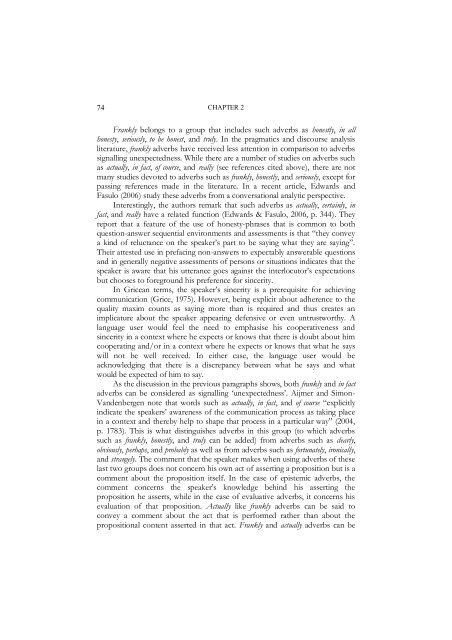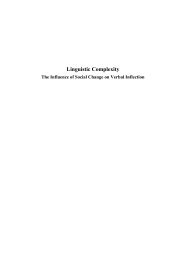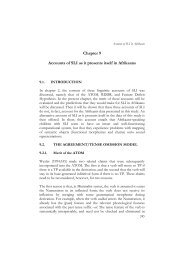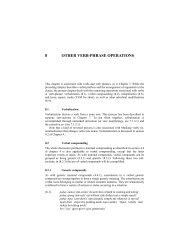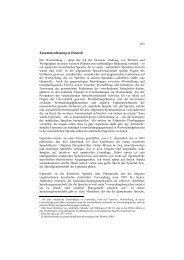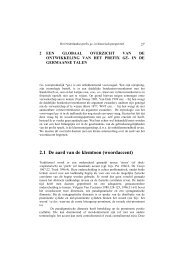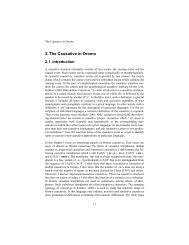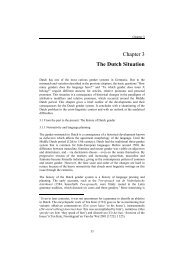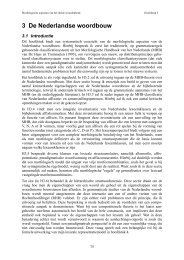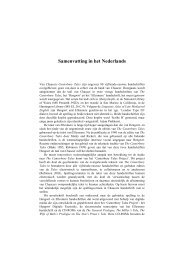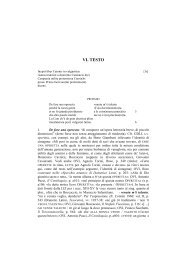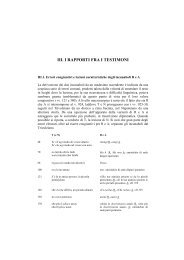chapter 2 stance adverbs qualifying a standpoint - LOT publications
chapter 2 stance adverbs qualifying a standpoint - LOT publications
chapter 2 stance adverbs qualifying a standpoint - LOT publications
You also want an ePaper? Increase the reach of your titles
YUMPU automatically turns print PDFs into web optimized ePapers that Google loves.
74<br />
CHAPTER 2<br />
Frankly belongs to a group that includes such <strong>adverbs</strong> as honestly, in all<br />
honesty, seriously, to be honest, and truly. In the pragmatics and discourse analysis<br />
literature, frankly <strong>adverbs</strong> have received less attention in comparison to <strong>adverbs</strong><br />
signalling unexpectedness. While there are a number of studies on <strong>adverbs</strong> such<br />
as actually, in fact, of course, and really (see references cited above), there are not<br />
many studies devoted to <strong>adverbs</strong> such as frankly, honestly, and seriously, except for<br />
passing references made in the literature. In a recent article, Edwards and<br />
Fasulo (2006) study these <strong>adverbs</strong> from a conversational analytic perspective.<br />
Interestingly, the authors remark that such <strong>adverbs</strong> as actually, certainly, in<br />
fact, and really have a related function (Edwards & Fasulo, 2006, p. 344). They<br />
report that a feature of the use of honesty-phrases that is common to both<br />
question-answer sequential environments and assessments is that “they convey<br />
a kind of reluctance on the speaker‟s part to be saying what they are saying”.<br />
Their attested use in prefacing non-answers to expectably answerable questions<br />
and in generally negative assessments of persons or situations indicates that the<br />
speaker is aware that his utterance goes against the interlocutor‟s expectations<br />
but chooses to foreground his preference for sincerity.<br />
In Gricean terms, the speaker‟s sincerity is a prerequisite for achieving<br />
communication (Grice, 1975). However, being explicit about adherence to the<br />
quality maxim counts as saying more than is required and thus creates an<br />
implicature about the speaker appearing defensive or even untrustworthy. A<br />
language user would feel the need to emphasise his cooperativeness and<br />
sincerity in a context where he expects or knows that there is doubt about him<br />
cooperating and/or in a context where he expects or knows that what he says<br />
will not be well received. In either case, the language user would be<br />
acknowledging that there is a discrepancy between what he says and what<br />
would be expected of him to say.<br />
As the discussion in the previous paragraphs shows, both frankly and in fact<br />
<strong>adverbs</strong> can be considered as signalling „unexpectedness‟. Aijmer and Simon-<br />
Vandenbergen note that words such as actually, in fact, and of course “explicitly<br />
indicate the speakers‟ awareness of the communication process as taking place<br />
in a context and thereby help to shape that process in a particular way” (2004,<br />
p. 1783). This is what distinguishes <strong>adverbs</strong> in this group (to which <strong>adverbs</strong><br />
such as frankly, honestly, and truly can be added) from <strong>adverbs</strong> such as clearly,<br />
obviously, perhaps, and probably as well as from <strong>adverbs</strong> such as fortunately, ironically,<br />
and strangely. The comment that the speaker makes when using <strong>adverbs</strong> of these<br />
last two groups does not concern his own act of asserting a proposition but is a<br />
comment about the proposition itself. In the case of epistemic <strong>adverbs</strong>, the<br />
comment concerns the speaker‟s knowledge behind his asserting the<br />
proposition he asserts, while in the case of evaluative <strong>adverbs</strong>, it concerns his<br />
evaluation of that proposition. Actually like frankly <strong>adverbs</strong> can be said to<br />
convey a comment about the act that is performed rather than about the<br />
propositional content asserted in that act. Frankly and actually <strong>adverbs</strong> can be


